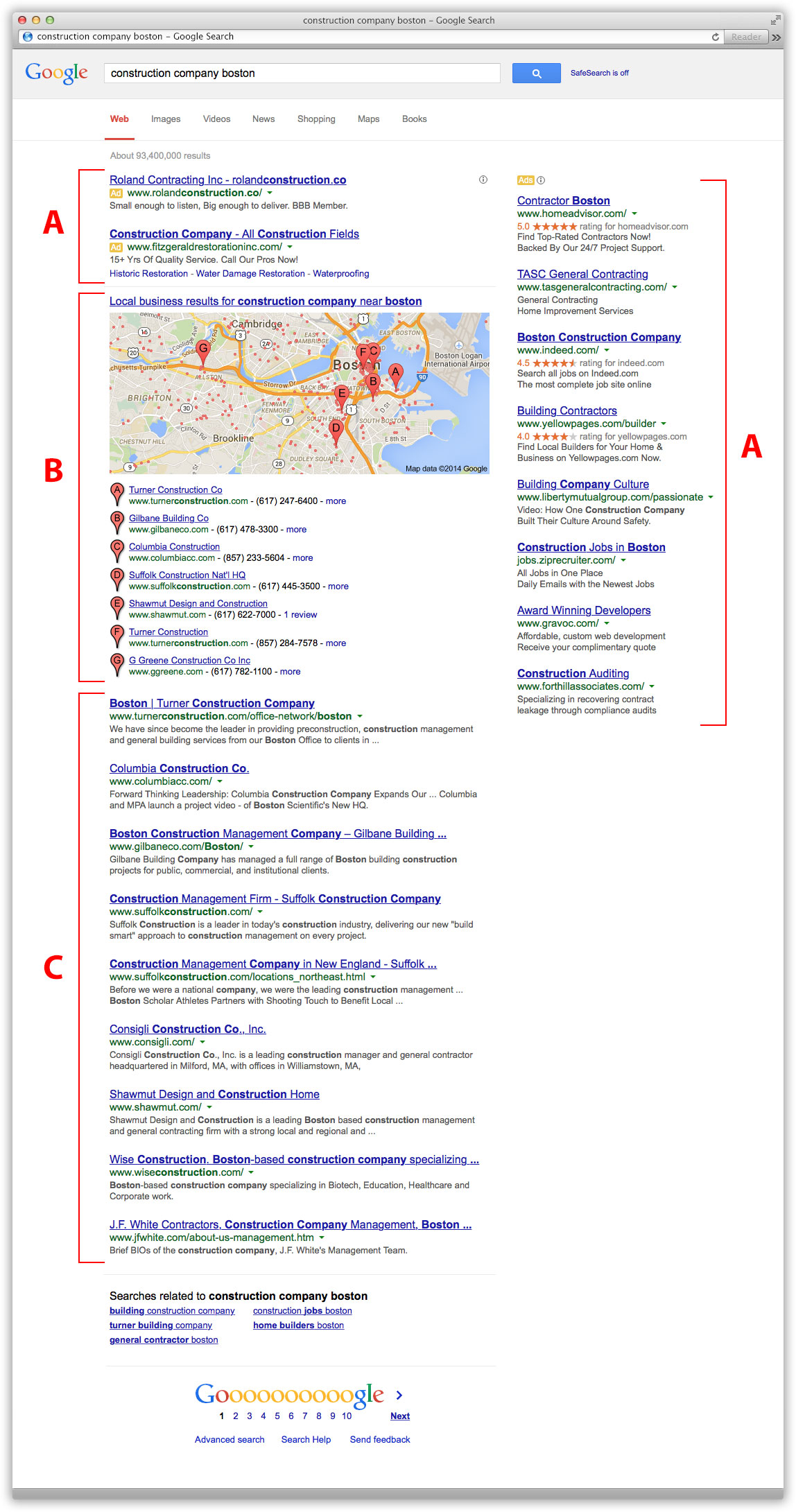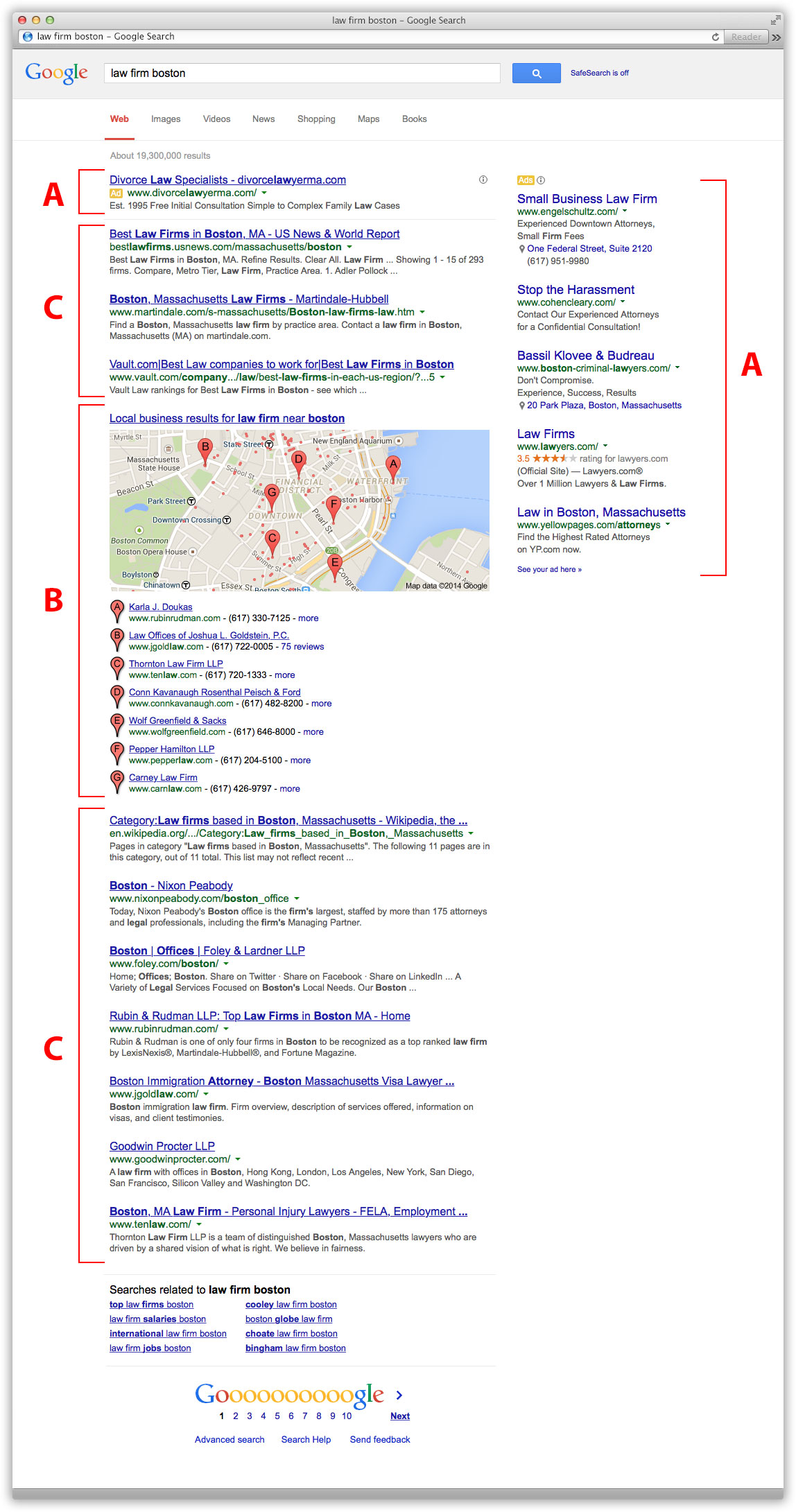
 The overall goal of SEO, or “Search Engine Optimization”, is to improve a website’s ranking in a search engine’s “organic” or un-paid search results. Most people immediately assume high rankings are something they must have, even if the cost of getting those high rankings is, well, high. But spending marketing time and dollars on SEO should be considered carefully. In some instances, returning high can actually be detrimental to your marketing efforts. Let’s consider SEO, starting from the basics:
The overall goal of SEO, or “Search Engine Optimization”, is to improve a website’s ranking in a search engine’s “organic” or un-paid search results. Most people immediately assume high rankings are something they must have, even if the cost of getting those high rankings is, well, high. But spending marketing time and dollars on SEO should be considered carefully. In some instances, returning high can actually be detrimental to your marketing efforts. Let’s consider SEO, starting from the basics:
Organic versus paid search results
There are two main types of search results, “organic” and “paid”. When I Google the keywords “construction company Boston” and “law firm Boston” here’s what I see:
The areas marked “A” are paid ads. Also called “Pay-Per-Click”, you must bid on keywords (such as “construction company Boston” or “law firm Boston”, as in these examples) and based on the amount you bid and other factors, your listing may appear in the top or right sidebar areas when someone “Googles” for those keywords. Personally, I avoid clicking on paid listings, they are often not at all what I am looking for. The area marked “B” shows organic “Local Search Results”, and the area marked “C” shows the top organic returns. (More info on Local Search is near the bottom of this article.)
How to rank highly, organically
Google makes it very hard to “cheat”. Google constantly changes its algorithms to improve search results for accuracy, relevance, and to prevent ways of spamming the system. Yes, it’s important that your site is built correctly and programmed cleanly, so it is crawlable and includes XML sitemap files. Yes, links from external, credible sites to your site help your rankings (but if they are not credible sites, you can get penalized). Yes, optimizing your site for mobile viewing with responsive design may improve your organic rankings. But more than anything, relevant, fresh, informative content is the most important criterion for improving your organic search results.
It’s a process, not a project
SEO is not a “once-and-done” effort, it is an ongoing activity. The content on your website must be kept current, not stagnant. That means you have to write – often. Plus, you need to blog, Tweet, post to Facebook and LinkedIn, and maybe even add videos to YouTube. It’s work; it takes time; and time is valuable. There’s no silver bullet. Google is too smart for that.
Ranking high… for what?
Often, clients ask me “How can I get my company to rank #1 on Google?” My response is always, “Rank #1 on Google for what?” When considering SEO, step one is to define what you want to return high for. In the examples I used above, I searched for “construction company Boston”and “law firm Boston”, and many of the top, big firms showed up. But who, really, would search for “construction company Boston” or “law firm Boston”? Is it a person with a multimillion-dollar budget or high-stakes case? Or is it, more likely, someone looking to remodel their bathroom or get a divorce? The last thing you want as a marketer is to spend time and money on SEO, only to be inundated with calls from prospects you don’t want. Think about your clients and what specific services you offer that they might really Google for. For example, if you offer a niche service – something unusual that is hard to find – consider spending more time optimizing for that. Furthermore, if you do have an area of specialty that is B2C (like home remodeling, divorce law, etc.), start there for SEO work.
How key are keywords?
It is important that your content be meaningful to your readers. Write for humans, use different words and mix things up. It’s impossible to predict the exact words people may Google for, so don’t waste too much time trying. Concentrate on writing educational, interesting content, not loading keywords onto pages.
Meta descriptions
Meta descriptions are the snippets that show up on search returns under each link. These “Keyword Meta Tags” are important because they help people understand why they should click on your link, rather than the one above or below. However, Google announced back in 2009 that they do not use this information to determine your page ranking. So craft these tags as you would any marketing headline: to entice your target audience.
Local search tips
Here are a few tips to help you rank in Local Search Results: Your website must be rich with relevant content, you can’t get around that. Be sure to include your company’s name and address (I like to add that to the footer of every website I design so it’s on every page.) In addition, be sure to list your company on Google+ Local, Yahoo Local, Bing, and review sites like Yelp, and make sure your listings are exactly the same — Google is looking for consistency in your NAP (Name, Address, and Phone number). To check for inconsistencies, go to Yext.com. Include NAP on social media (Facebook, Twitter, LinkedIn). Get reviews on Yelp and other sites.
Once they click, then what?
SEO and pay-per-click can help drive traffic to your site, but from there your job, really, has just begun. Spending money on SEO and paid Google advertising can be a waste if your website is not designed and built to help convert those clicks to clients. Consider what happens after the click. Will the visitor be dumped on your home page, or on a page specifically designed for the keywords they searched for? Is there an immediate call-to-action? If you drive them to a phone number, will you be able to track that phone number to the specific search?
Think “thought leadership,” not search returns
At Clockwork Design Group, we work primarily with B2B professional service firms including architecture, engineering, construction, legal and financial firms. The work our clients do is specialized; the projects are typically complex and very costly. Thus, few credible new business prospects find them on Google. Rather, prospects usually have a “shortlist” of firms they know and like, and supplement with referrals from trusted advisors.
So why spend time and money on SEO? Although your target prospects may not be “Googling” to find you, relevant, educational content is still necessary to build trust and win business. Savvy businesspeople are on the web every day reading articles, news, blogs, and more. Significant projects are awarded to service firms that have strong brands and reputations. That’s how we get on the shortlists. By writing pertinent content, your firm grows a reputation as a thought leader, and you stay top-of-mind with your clients and prospects. By doing so, you are also improving your SEO.
For some great insights to SEO, check out the free PDF book “20 SEO Myths You Should Leave Behind in 2020” by HubSpot, available here.
Vanessa’s article first appeared in SMPS Boston’s Outlook, December 22, 2014.






